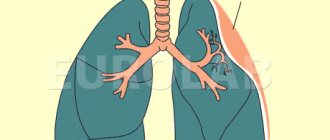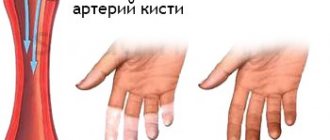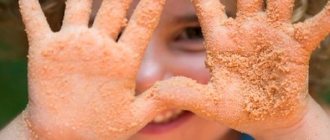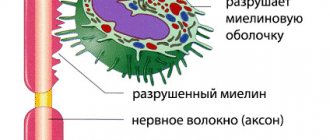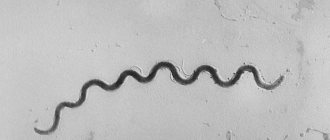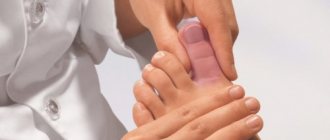- If a foreign body enters the respiratory tract
How to treat barking cough in adults and children depends on the cause of the development of the pathology, existing signs, contraindications, the age of the patient and a number of other factors. A dry cough can be a reflex reaction of the human body in response to irritation of the mucous membranes of the respiratory tract. It can also develop in certain diseases.
A barking cough requires seeing a doctor; self-medication is unacceptable
To make a diagnosis you need:
- collection of complaints and medical history;
- physical diagnosis;
- laboratory tests;
- X-ray examination;
- computer or magnetic resonance imaging, etc.
The choice of medications and methods of therapy for barking cough should be made by a qualified specialist.
Self-medication with the development of this clinical sign is not recommended, as it can lead to progression of the pathology, suffocation or other complications, and in especially severe cases, even death.
Why does a cough sound like barking?
Any type of cough occurs due to inflammation in the upper or lower tracts of the respiratory system. The bronchi, pharynx, lungs, and trachea take part in the process. Dry barking cough has the same nature of formation.
The receptors are irritated, causing swelling of the soft tissues of the respiratory system. Infections penetrate rapidly from the upper to the lower organs of the system. Mucus collects in the respiratory organs, but with a dry type of barking cough it does not come out, but remains inside, allowing infection and bacteria to multiply further.
But a barking cough is not always a sign of ARVI or other infectious diseases. Often indicates the presence of allergies, nervousness, and pathologies of the cardiovascular system. If we speak not in medical terms, but in simple human language, then this is evidence of the body’s struggle with the problem.
In fact, in the process of coughing of any type, more organs and systems are involved than we used to think:
- impulses are initially sent to the brain;
- supply from the brain to the muscles of the respiratory system;
- contraction of the diaphragm;
- push of air.
Since air passes through the vocal cords when coughing, sounds are naturally heard. The narrower the lumen of the larynx, the stronger the inflammatory process. The sound changes.
Need to know! In children, the lumen of the larynx is smaller and narrower. Therefore, the appearance of a barking cough in childhood is several times more common than in an adult. The inflammatory process, even a minor one, leads to coughing and causes stenotic changes.
How to treat a severe cough without fever in an adult
Treatment of diseases accompanied by cough at normal body temperature can occur in a hospital or at home under the supervision of a physician.
Neurogenic cough does not require special treatment; only in severe cases, patients are prescribed sedatives; they may need to work with a psychologist or psychotherapist.
The prescription of certain medications depends on the symptoms associated with cough, contraindications, age and some other factors. Thus, if a patient has difficult-to-clear sputum, mucolytic, expectorant medications are used, which help thin the mucus and improve its removal from the respiratory tract. If the patient develops painful attacks of dry cough (only in the absence of mucus accumulations in the respiratory tract), antitussive drugs can be used. In case of allergies, it is necessary to exclude contact with the allergen; antihistamines are prescribed.
For a dry cough in an adult against a background of normal body temperature, it is convenient to use drugs in the form of lollipops (especially if it is necessary to stop the cough outside the home). Such lollipops can be purchased at a pharmacy or made independently at home.
Diseases of the respiratory system in which a barking cough is detected
To cure a barking cough quickly and without consequences, it is necessary to conduct a diagnosis, identify the provocateur and make the correct diagnosis. There are a number of diseases that provoke the occurrence of this type of cough. These include:
- foreign body after entering the throat;
- allergies and measles;
- whooping cough (parawhooping cough) and diphtheria;
- laryngitis and scarlet fever;
- cartilage chondroperichondritis and laryngotracheitis;
- pharyngitis and tonsillitis.
It is possible that a dry barking cough in an adult without fever will indicate the appearance of scars after burns and injuries, purulent inflammatory processes and the consequences of radiation therapy.
Quite often, a barking cough makes it clear to a person that it is necessary to undergo examination to establish an accurate diagnosis. Based on the symptoms, you can also guess the cause of the barking.
Prevention
To avoid diseases, the symptom of which is a “barking” cough, it is worth applying such preventive measures as:
- Vaccination against whooping cough and diphtheria. You can also get vaccinated against influenza for prevention.
- Maintaining optimal indoor air parameters.
- Increasing local immunity.
- Hiking in the fresh air, no less. than 1 hour a day.
At the first symptoms of a viral infection, you need to start treatment on time. to avoid complications.
Symptoms and treatment of pharyngitis in children
This article will tell you how to cure a cough with tracheitis.
Signs of otitis in a child //drlor.online/zabolevaniya/uxa/otit/simptomy-i-lechenie-u-detej.html
Drug treatment
A characteristic cough is a symptom of more than a dozen diseases. Therefore, a doctor can prescribe drug therapy after a detailed study of symptoms, diagnosis, and medical history. To calculate the intake, use a table that clearly indicates the dosage of drugs in accordance with the return, weight and condition of the patient.
If an antibacterial complex is not required, then the following will be prescribed:
| Group | Application | Medicines |
| Combined | Dosage forms simultaneously relieve symptoms | Stoptussin or Phyto Codelac |
| Antihistamine | An effective way to completely eliminate swelling of the soft tissues of the throat and respiratory system. Used for bronchitis, allergies, asthma | Loratadine, Fenistil, Clemastine, Suprastin, Eden, Tavegil, Diazolin |
| Mucolytic | Used to quickly transition from a dry cough to a wet one | Syrups: Lazolvan, Bronholitin Other forms: ACC, Bromhexine |
| For expectoration | Sputum discharge becomes softer, more natural and faster. Cleanses the bronchi and respiratory tract | It is advisable to use herbal medicines: Doctor IOM, Gedelik and Mucoltin |
| Antitussive | Effects the central nervous system, stopping the cough reflex | Prenoxdiazine, Robitussin, Terpinkod, Codeine, Sinekod, Delsim |
Be sure to study adverse reactions and contraindications before use. The patient must understand that the doctor is also a person and may not take into account some factors.
Be sure to warn your physician about allergic reactions to the components. This is the only way to carry out safe therapy that will help you quickly get rid of a barking cough.
Antibacterial drugs
Viral diseases can be treated with antibacterial dosage forms or antibiotics. Therapy is prescribed to reduce the growth of bacteria and viruses and promote rapid healing.
When taking this course, you need to drink a vitamin complex, minerals and yoghurt. This is due to the fact that antibiotics destroy not only pathogenic microorganisms, but also beneficial ones.
Therefore, the circuit must contain auxiliary components. Homeopathy in such cases is allowed as an auxiliary, not as a primary one.
During pregnancy, medications for barking cough are prescribed with extreme caution. Tests are always done to determine the tolerance of antibacterial agents. There are three main groups of drugs:
- cephalosporin: Suprax and Cefaclor, Ceftriaxone and Cephabol;
- macrolide: Vilprafen and Sumammed, Rovamycin and Azithromycin;
- penicillin: Amoxiclav and Ecoclave, Amosin and Flemoxin, Ecobol and Augumentin.
It is most likely that the penicillin group will be prescribed, since antibiotics of this group are capable of destroying the largest part of microbes, infections, and bacteria. Only in case of poor perception tests is one of the first groups selected.
Probiotics that will help mitigate the effects of antibiotics on the immune system include Linex and Laktovit, Hilak Forte and Bifidumbacterin.
Eliminate the cause of the cough
If you have a barking cough and fever, then it is probably due to an infection. Depending on its nature, appropriate treatment is selected. It is possible to determine whether bacteria, viruses or fungi provoked the pathology using a laboratory test.
- In case of a viral infection (laryngitis, pharyngitis, croup, tracheitis), the patient is prescribed immunomodulatory agents and antiviral drugs: Cycloferon, Isoprinosine, Lykopid, Polyoxidonium and others. If the patient has good immunity, then the use of all these drugs can be completely abandoned. The body will cope with the virus on its own within 3-5 days.
- Bacterial diseases (bronchitis, tonsillitis) must be treated with antimicrobial agents. In this case, you should not refuse them even with strong immunity. The most commonly used penicillin antibiotics are amoxicillin-based and macrolides containing azithromycin. Other types of antibiotics may be prescribed at the discretion of the doctor.
- For laryngospasm caused by an allergic reaction, the patient requires antihistamines. They are selected for each person separately, taking into account all the characteristics of the body. First generation drugs (Suprastin, Diphenhydramine) act quickly, but for a short time. In addition, they cause drowsiness. The newest antihistamines (Cetrin, Loratadine) can be taken only once a day. Their effect is longer lasting, but does not occur as quickly as their predecessors.
Inhalation
As additional procedures, the most gentle but effective ones are inhalations using a nebulizer. As a liquid for vaping against a barking cough, you can use both drugs and folk remedies, the cost of which is much lower.
The action and result are at a high level. You can use mineral water, milk and salt infusions. There are more than a hundred recipes for inhalations. It is worth selecting according to symptoms, taking into account the age and condition of the patient.
So it is recommended to use Acestine and ACC, essential oils, Fluimucil and coltsfoot, licorice, plantain and elecampane, and calendula.
Important! In the presence of elevated temperature, heart and vascular diseases, inhalation is strictly prohibited. If a woman is pregnant or breastfeeding, inhalations can only be started with the permission of a doctor. Be sure to check the body’s reaction to an allergic reaction to the drug or traditional recipe used.
Allergic swelling of the larynx
Another emergency condition accompanied by a barking cough is allergic laryngeal edema. This condition is usually considered within the framework of Quincke's edema - one of the most dangerous allergic complications.
Allergic swelling of the larynx always develops very quickly in response to an allergen entering the body. The main signs are a barking cough and choking.
Therefore, if a barking cough suddenly appears after administering any medication or inhaling chemical vapors, you should immediately go to the hospital.
First measures: do not panic, provide access to fresh air, unbutton the top buttons. If possible, inhale 1-2 doses of a hormone-containing inhaler (beclomethasone, pulmicort, symbicort), take a pill (or better yet, inject an antiallergic drug).
During pregnancy and lactation
It is strictly forbidden to take dosage forms, especially antibiotics, expectorant medications on your own. Only a therapist, together with a gynecologist, can give the necessary recommendations.
To relieve inflammatory processes during an acute cough in the evening, it is recommended to use methods such as gargling and inhalation. Before you start using methods, study the possible consequences.
Harmless, non-harmful options for stopping a barking cough are: indoor humidification, large amounts of liquid, gargling with soda. These methods will reduce inflammation, but you should definitely see a doctor in the morning for diagnosis and to draw up a safe treatment regimen.
Dietary nutrition is considered as an auxiliary measure for barking cough. Excluding irritants from the diet (salt, spicy, sweet, seasonings, bitter) will help soothe the mucous membranes.
Application of alternative medicine
You can get rid of a dry barking cough without the use of pharmaceuticals. Doctors often advise their patients to take advantage of physical therapy. Treatment with inhalation (nebulizer), UHF heating, and electrophoresis show good results. Don't forget about traditional medicine. Sometimes ordinary tea with honey, herbal decoction, warm, natural milk are more beneficial than dangerous antibiotics or anti-inflammatory drugs.
Kovalchuk Irina Timofeevna
37 years of experience
Pulmonologist of the highest category. Engaged in the diagnosis and treatment of respiratory tract pathologies. Accepts patients with chronic bronchitis, pneumonia, bronchial asthma, and occupational respiratory diseases.
Folk methods of struggle
It is impossible to completely remove a barking cough using folk recipes. Moreover, diseases such as measles or whooping cough cannot be treated with herbs and decoctions. Only as an auxiliary therapy, such as cough suppressants, as well as vitamin complexes, it is allowed to add an alternative medicine recipe to the regimen.
Decoctions, infusions, and tinctures of marshmallow, ivy and sage are distinguished by their effectiveness and safety. Quite often used for barking coughs are licorice root and coltsfoot flowers, thyme and plantain leaves.
Chamomile and plantain decoctions and syrups do not cause an allergic reaction. But such herbs should be brewed strictly according to the instructions, as they can cause stomach upset.
Suitable for brewing separately and as an additive to tea. They are brewed as standard: pour boiling water and leave for a quarter of an hour. Take warm. Honey products are added to improve the taste.
Compresses are an alternative to inhalations and antitussive dosage forms for barking coughs. Badger and goat fat are used to lubricate the chest. Goose is not always suitable.
And ursine practically does not cause allergies. Fats are added to milk and honey. Combining a compress and medicinal liquid increases the chances of quick and gentle mucus discharge in the presence of a barking cough. You can also create syrups and lollipops with your own hands.
Laryngitis
Laryngitis is an inflammation of the mucous membrane of the larynx. The cause of laryngitis in 90% of cases is respiratory viruses - influenza, parainfluenza, adenovirus, rhinosyncytial infection and others. As a result of inflammation, swelling of the mucous membrane of the larynx occurs, which leads to a narrowing of its lumen . In addition, the mucous membrane of the vocal folds swells, their closure is incomplete, as a result of which the sonority of the voice is impaired. The mucus formed as a result of inflammation is an additional factor that impedes the passage of air and irritates cough receptors.
The main manifestations of laryngitis:
- Dry obsessive “barking” cough, sometimes with the discharge of a small amount of sputum.
- Hoarseness of the voice, sometimes to the point of complete aphonia.
- Feeling of rawness, soreness in the larynx, feeling of a lump in the throat.
laryngitis
Basic principles of laryngitis treatment:
- Voice rest for several days.
- Humidification of the surrounding air.
- Inhalations with saline solution.
- Food that does not irritate the mucous membrane.
- Warmth on the neck (compresses, woolen scarf).
- Distraction procedures (foot baths, mustard plasters on the shins, warm socks)
- Antitussives, antihistamines.
- Antibacterial agents for severe laryngitis with fever, intoxication, purulent sputum.
- Intralaryngeal applications of antiseptic drugs, antibiotics, emollient vegetable oils, hormones (produced by a specialist).
